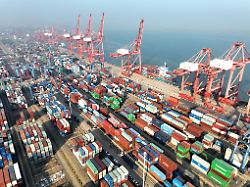Much more imports than exports
That’s how dependent the German economy is on China
06/20/2023, 1:11 p.m
Whether electronic devices or important raw materials: China is now Germany’s most important trading partner. Many increasingly see this economic dependency as a risk. But according to a study, the profits are “simply too attractive”.
China has long been Germany’s most important trading partner. The country has become increasingly important for the German economy in recent decades and has held the top spot in foreign trade statistics since 2016. According to the Federal Statistical Office, the extent of the mutual exchange of goods last year was almost 299 billion euros. That was about a doubling within ten years, in 2012 it was 145 billion euros.
Significant import surplus
Germany imported significantly more goods from China than it exported there – according to the Federal Office, the so-called import surplus rose to a new peak of around 85 billion euros in 2022. While China was by far Germany’s most important trading partner in terms of imports with a volume of 192 billion euros last year, the situation was different when it came to exports: the USA, France and the Netherlands bought more German goods than China.
According to experts, this continued a significant shift in weighting within the German-Chinese trade balance: While China has been becoming more important as a procurement market for years, sales of German products there have not kept pace with the development. China was the second most important destination for German exports in 2020 and 2021, before slipping to fourth place last year according to preliminary data.
Notebooks and smartphones from China
Germany mainly sells cars, car parts and machines to China, as detailed data from the Federal Statistical Office on the trade balance for the first quarter of the current year shows. Conversely, China mainly supplies electronic devices and machines, as well as raw materials. According to the statisticians, “many everyday products” have long come to a large extent from China. This also applies to goods that are important for future technologies such as e-mobility.
The Federal Office lists an example of what that means in detail: Measured by the value of the goods, around 86 percent of the imported notebooks and tablets and around 68 percent of the smartphones and telephones came from China in the first quarter of 2023. The same applied to about 39 percent of all lithium-ion batteries. In the case of the rare earths that are indispensable for the construction of high-tech components, for example in the field of renewable energies, import dependency was 92 percent.
Thousands of companies operating in China
More than 5,000 German companies with 1.1 million employees are active in China – in addition to the large, well-known companies such as Volkswagen or BASF, there are also countless medium-sized companies such as the chain saw manufacturer Stihl, the mechanical engineering company Trumpf or the gummy bear manufacturer Haribo. They benefit from cheap labor and a huge domestic market.
In recent years, the German economy has mainly complained about restrictions and discrimination in the People’s Republic compared to Chinese companies – for example due to being forced to set up a joint venture with a Chinese company or the lack of access to certain economic sectors. During the pandemic, the strict corona measures in the People’s Republic were added.
Geopolitical tensions are increasing
With Russia’s war of aggression against Ukraine and Beijing’s military threats towards Taiwan, however, the entire economic dependency on China is now increasingly seen as a risk. In politics and to some extent also in business, there is therefore a discussion as to whether and how the German economy as a whole could position itself more broadly.
However, there are also voices, especially from business, who consider this to be unrealistic due to China’s economic importance for the global economy and the business of individual companies. The Chinese sales market and the profits to be expected there appeared “simply too attractive” to consider turning away, according to a study by the Institute of German Economics in Cologne.
